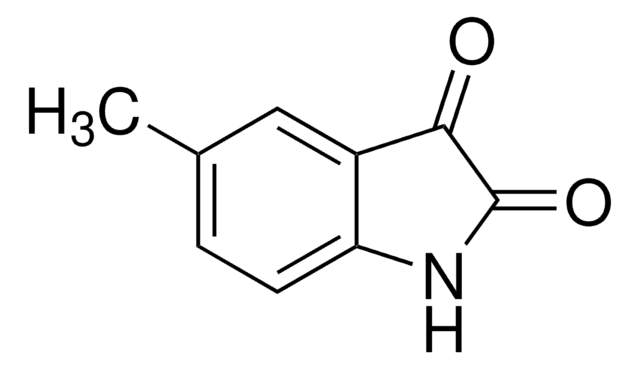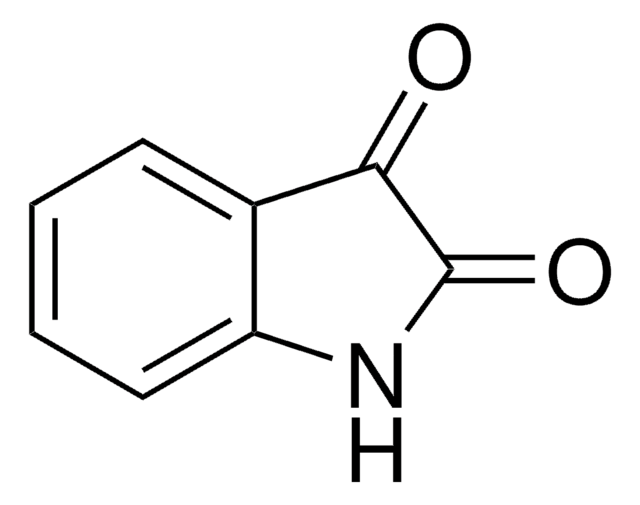234478
1-Chloro-3-iodopropane
99%
Synonym(s):
Trimethylene chloroiodide
Sign Into View Organizational & Contract Pricing
All Photos(1)
About This Item
Linear Formula:
Cl(CH2)3I
CAS Number:
Molecular Weight:
204.44
Beilstein:
1731115
EC Number:
MDL number:
UNSPSC Code:
12352100
PubChem Substance ID:
NACRES:
NA.22
Recommended Products
vapor density
6.8 (vs air)
Quality Level
vapor pressure
2 mmHg ( 20 °C)
Assay
99%
form
liquid
contains
copper as stabilizer
refractive index
n20/D 1.548 (lit.)
bp
170-172 °C (lit.)
density
1.904 g/mL at 25 °C (lit.)
functional group
chloro
iodo
SMILES string
ClCCCI
InChI
1S/C3H6ClI/c4-2-1-3-5/h1-3H2
InChI key
SFOYQZYQTQDRIY-UHFFFAOYSA-N
Looking for similar products? Visit Product Comparison Guide
General description
1-Chloro-3-iodopropane undergoes asymmetric α-alkylation with N-sulfinyl imidates to yield 2-substituted N-tert-butanesulfinyl-5-chloropentanimidates. Electroreduction of 1-chloro-3-iodopropane at glassy carbon electrode in dimethylformamide containing tetra-n-butylammonium perchlorate has been investigated by cyclic voltammetry. It also participates in conjugate addition of alkyl iodides to α,β-unsaturated nitriles in water.
Application
1-Chloro-3-iodopropane has been used in the synthesis of:
- N-[4-[5-(2,4-diamino-6-oxo-1,6-dihydropyrimidin-5-yl)-2-(2,2,2-trifluoroacetyl)pentyl]benzoyl]-L-glutamic acid, an inhibitor of glycinamide ribonucleotide transformylase (GAR Tfase) and aminoimidazole carboxamide ribonucleotide transformylase (AICAR Tfase)
- interesting ″proton sponge″ type molecule quino[7,8-h]quinoline
Signal Word
Warning
Hazard Statements
Precautionary Statements
Hazard Classifications
Eye Irrit. 2 - Skin Irrit. 2 - STOT SE 3
Target Organs
Respiratory system
Storage Class Code
10 - Combustible liquids
WGK
WGK 3
Flash Point(F)
230.0 °F - closed cup
Flash Point(C)
110 °C - closed cup
Personal Protective Equipment
dust mask type N95 (US), Eyeshields, Gloves
Choose from one of the most recent versions:
Already Own This Product?
Find documentation for the products that you have recently purchased in the Document Library.
Customers Also Viewed
Synthesis of 1, 2, 3, 4-tetrahydroquinolines and 1, 2, 3, 4-tetrahydro-1, 6-naphthyridines by a directed lithiation reaction.
Reed JN, et al.
Tetrahedron Letters, 29(45), 5725-5728 (1988)
Electrochemical Reduction of 1, 3-Dihalopropanes at Carbon Cathodes in Dimethylformamide.
Pritts WA and Peters DG.
Journal of the Electrochemical Society, 141(4), 990-995 (1994)
Fraser F Fleming et al.
The Journal of organic chemistry, 72(18), 6961-6969 (2007-08-10)
A new silica-supported zinc-copper matrix reagent promotes the conjugate addition of alkyl iodides to cyclic and acyclic alkenenitriles in water. X-ray diffraction and electron microscopy techniques suggest that the active copper species generated from elemental zinc and copper(I) iodide is
Filip Colpaert et al.
The Journal of organic chemistry, 76(1), 234-244 (2010-12-02)
α-Alkylation of N-sulfinyl imidates with 1-chloro-3-iodopropane successfully led to 2-substituted N-tert-butanesulfinyl-5-chloropentanimidates in acceptable diastereomeric ratios (dr 67/33 to 72/28) and good yields (74-86%). Subsequent reduction with NaBH(4) led to the corresponding 2-substituted N-tert-butanesulfinyl-5-chloropentylamines, which could be cyclized to a range
Heng Cheng et al.
Bioorganic & medicinal chemistry, 13(10), 3593-3599 (2005-04-26)
The synthesis and evaluation of N-[4-[5-(2,4-diamino-6-oxo-1,6-dihydropyrimidin-5-yl)-2-(2,2,2-trifluoroacetyl)pentyl]benzoyl]-L-glutamic acid (2) as an inhibitor of glycinamide ribonucleotide transformylase (GAR Tfase) and aminoimidazole carboxamide ribonucleotide transformylase (AICAR Tfase) are reported. The inhibitor 2 was prepared in a convergent synthesis involving C-alkylation of methyl 4-(4,4,4-trifluoro-3-dimethylhydrazonobutyl)benzoate
Our team of scientists has experience in all areas of research including Life Science, Material Science, Chemical Synthesis, Chromatography, Analytical and many others.
Contact Technical Service















